Keeping a home clean requires the right tools. This comprehensive guide covers the most useful cleaning tools to make housework easier, more efficient, and eco-friendly.
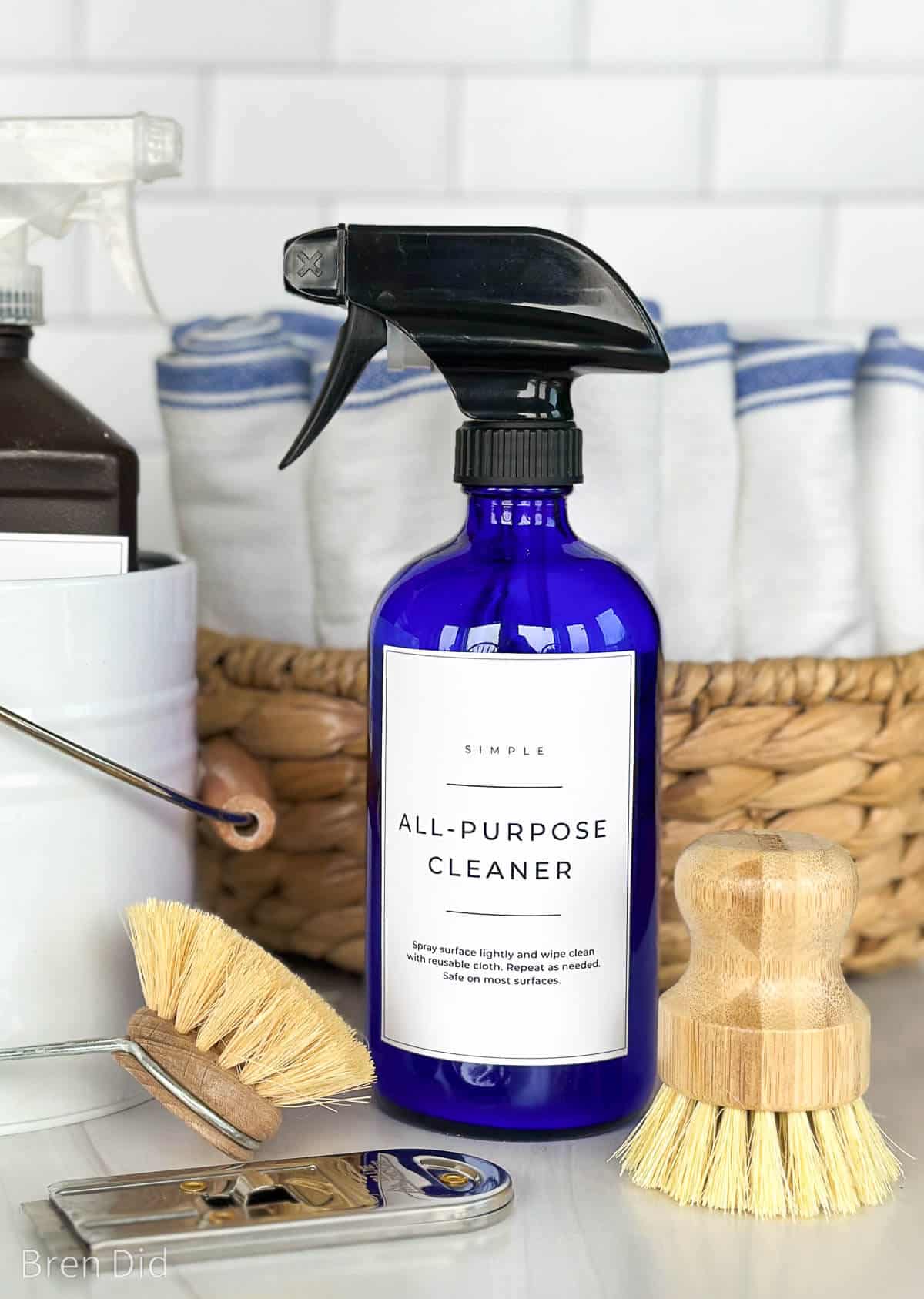
Disclosure: This post contains affiliate links, which means I get a small commission if you decide to purchase through my link, at no cost to you. The products I link are ones I use and believe in. For more info, read my Policies & Disclosures.
—
Advertisers insist we need to buy a wide variety of vacuums, scrub brushes, and single-use cleaning wipes to keep our homes clean. This is fear-based marketing designed to sell more cleaning tools. In reality, you need just a few basic cleaning tools to clean your home safely and efficiently.
These eco-friendly cleaning tools will help you get your whole home sparkling cleaning without creating lots of unnecessary waste or having to find a place to store lots of unnecessary cleaning gadgets.
Ignore the hype and make sure you have only the tools you need for your cleaning routine.
Tools and Equipment that Make Cleaning Easier
Cleaning tools make cleaning faster and more effective. These basic cleaning tools can be used on their own to physically remove dirt and dust or be paired with a cleaner. They’re enough to get the whole house clean!
Learn about each tool, how they help conquer messes, and learn which version I use.
Best tools for Scrubbing
Cotton Cleaning Cloths
Reusable cleaning cloths are gentle enough to dust surfaces and can be used to wipe and scrub. Cotton cleaning cloths are made from the natural fibers of the cotton plant. They are affordable, soft and absorbent, easy to launder, and biodegradable. However, cotton cloths can make picking up dirt and debris a bit more difficult and can leave lint behind. (Read about the pros and cons of Microfiber and Cotton Cloths.)
- Favorite cotton cleaning cloths: Upcycle cotton cleaning rags from an old tee shirt or buy 100% cotton cloths .
Lightweight Dish Towels (aka Reusable Paper Towels)
Paper towels are a heavily used, single-use item that creates lots of waste. Try replacing some paper towels with reusable paper towels: rags (upcycle them from old clothes or towels) or lightweight cotton towels. Reusable cotton towels can be used for dishes, cleaning counters, and drying your hands. You’ll save money and reduce landfill waste.
- Favorite cotton cleaning cloths: I love these 100% cotton blue striped dish towels. They look cute in a basket on the counter, wash well and last for years.
Scrubbing Sponge
A non-scratch sponge quickly scours away buildup and stains from ovens, countertops, bathtubs, and more without damaging surfaces. Choose scrubbers made from plant-based cellulose fibers and/or recycled materials, which are better for the environment than synthetic sponges. (Most conventional cleaning sponges are made from plastics such as melamine foam, engineered polymer foam, or synthetic cellulose fiber that cause microplastic pollution.) Use one sponge for the kitchen and a separate sponge for other cleaning tasks. Microwave for a minute or run through the dishwasher and allow to dry completely after each use.
- Favorite scrubbing sponges: Try using a compostable sponge and scourer. They work great and decompose naturally.
Stiff Scrubbing Brush
A stiff scrub brush aids in dishwashing, vegetable cleaning and even soap scum removal. Choose a bamboo or wooden dish brush for washing dirty dishes and produce and a separate brush for other cleaning tasks.
- Favorite scrubbing brush: I love long-handled wooden scrubbers and palm-sized wooden brushes that contain no plastic.
Small Soft Scrub Brush
A small, soft scrub brush can be used to quickly clean tight crevices and corners or uneven surfaces such as grout. It aids in dirt and laundry stain removal by working cleaners into soiled spots and physically loosening debris.
- Favorite soft brush: Upcycle an old toothbrush or choose a wooden or bamboo toothbrush that is better for the environment. This laundry brush works great, too.
Best Tools for Dusting and Wiping
Washable Duster
Ceiling fans, light fixtures, moldings, bookcases, and corners quickly collect dust. Use a soft duster with a washable head to wipe these hard-to-reach areas. No duster? Wrap a mop or broomstick handle with a microfiber cloth and secure with a rubber band. Run the duster along high edges, corners, bookcases, furniture, and baseboards to quickly remove debris before vacuuming to maximum dust removal.
- Favorite duster: Try a washable, reusable microfiber duster or a wood and felt version.
Microfiber Cleaning Cloths
Reusable microfiber cleaning cloths are made from tiny synthetic fibers (plastic). The fibers give the cloths increased cleaning power when compared to natural fabrics. Microfiber cloths are very effective at physically moving household dirt, such as dust, pollen, and bacteria, with water. Note: microfiber cloths are made of plastic and should be gently laundered and hung dry to lessen microplastic waste. Learn more about caring for microfiber clothes here (Read about the pros and cons of Microfiber and Cotton Cloths)
- Favorite microfiber cloths: I like these colorful microfiber cloths made with recycled plastic.
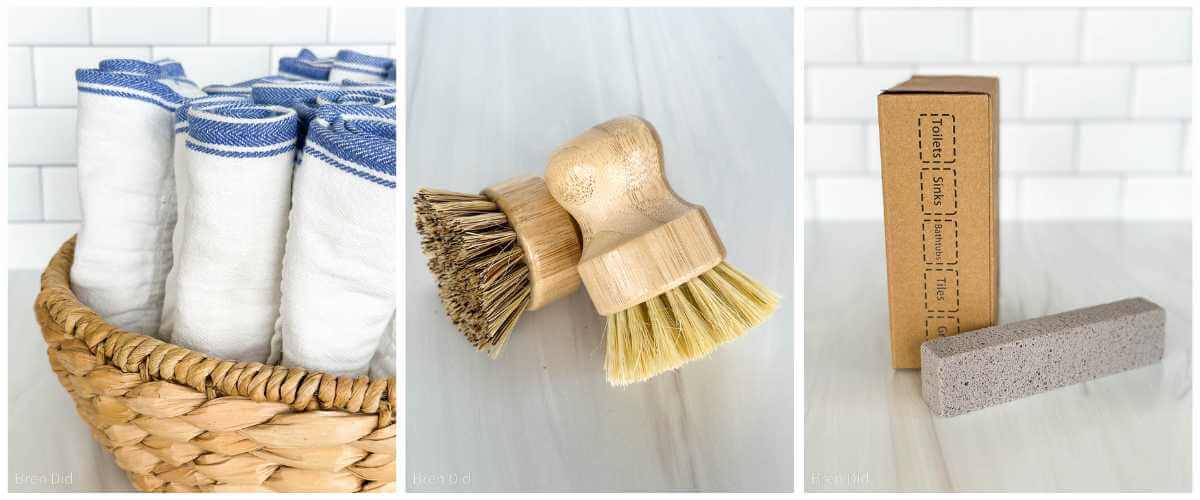
Best Tools for Cleaning Floors
Vacuum
A bagless vacuum with HEPA filtering is the fastest way to eliminate dust, dirt, and debris from the home. Vacuum hard floors, carpets, rugs, walls, hard surfaces, and furniture before applying cleaning products to remove dust quickly. This prevents dust from getting trapped by wet cleaners and makes cleaning more efficient. Add a soft brush attachment to clean blinds, curtains, shelves, and more!
- Favorite vacuum: I’m a fan of Shark lift-away vacuums with a self-cleaning brush roll; it keeps long hair and threads from getting tangled while you clean.
Washable Mop
A flat mop with a detachable microfiber cloth or cotton pads makes floor care quick and easy. Use the mop head dry to dust floors, walls, and ceiling fixtures, add a spritz of water or All-Purpose Cleaner to deep clean tile and hardwood floors. Choose reusable pads that detach for easy laundering.
- Favorite mop: If you own a swifter-top mop, continue to use it with DIY reusable cloths. If purchasing, I prefer a flat mop, but an old-school cotton mop is great if you do lots of heavy floor cleaning.
Broom and Dustpan
A durable broom and dustpan set makes cleaning up small messes quick and convenient; there is no need to haul out the vacuum! Look for a broom with soft, sturdy bristles that capture dirt and debris and are long enough to get into nooks & crannies.
- Favorite broom: Select a long-handled design to make daily sweeping comfortable and efficient.
- Favorite dustpan & brush: Choose a short-handled brush and dustpan if you don’t do much sweeping.
Robot Vacuum
A robot vacuum with HEPA filtering is definitely a luxury cleaning tool, but if you can afford it, it is the least labor-intensive way to eliminate dirt and dust in homes with lots of family members or pet hair. They can also be helpful if you live in a dusty climate or come and go frequently, allowing more dirt to be tracked into your home from outdoors.
- Favorite robot vacuum: Since we have large dogs that shed, I invested in this affordable robot vacuum when it went on sale . I’m in love!
Best Tools for Bathroom Cleaning
Toilet Brush
A stiff-bristled toilet brush will clean the toilet bowl with minimal effort. Buy a sturdy reusable brush with a long handle and its own holder. Use with Easy Bathroom Cleaner. Spray the brush head with Basic Disinfectant Spray and air dry between the toilet rim and seat after cleaning to disinfect.
- Favorite toilet brush: I love this Full Circle Toliet Brush with a replaceable head and stone drying disk.
Stiff Scrub Brush
A stiff-bristled scrub brush can help remove bathtub rings, soap scum, and greasy buildup left behind by shampoo, conditioner, and body wash. It’s an easy way to quickly clean large amounts of tile and grout.
- Favorite scrub brush: I prefer a short-handled scrub brush, if you want to scrub the tub or shower without bending or kneeling, look for a scrub brush with an extendable handle.
Squeegee
A squeegee with a flexible rubber blade is useful for cleaning glass shower doors and large windows with streak-free results. If you have lots of glass surfaces in your home or glass shower doors, consider adding a small squeegee to your cleaning tools. It allows for easy maneuvering and is ideal for hanging in the shower to quickly and effectively remove water and soap streaks after each shower. Use it daily to reduce steaks.
- Favorite squeegee: Any small, affordable squeegee you already own will do; I like this foldable version that looks nice hanging in the shower.
Best Specialty Cleaning Tools
Some difficult cleaning tasks or hard-to-reach spaces can benefit from a specialty cleaning tool. Consider adding these tools if you have challenging spaces to clean.
Rubber Gloves
Protective cleaning gloves are not 100% necessary when using gentle cleaners, but they can keep your hands from drying out, protect your nails, and help you get a better grip when cleaning slippery items. Invest in a reusable pair that can be rinsed and dried each time you clean.
- Favorite cleaning gloves: I purchased this heavy-duty pair at my local hardware store. They are thick and resist holes. Look for a store where you can try the gloves on for the best fit.
Step Ladder
A small step ladder makes it easier to clean hard-to-reach areas like cabinet tops, high shelves, and the top of the refrigerator.
- Favorite step ladder: I own two small stepladders: one study step stool to clean on and one mini fold flat stool to get things from high cupboards.
Large Plastic Cup
Bathtubs and showers can be particularly tricky to clean and rinse without a detachable shower hose. Upcycle an 18 to 20-ounce plastic cup or container to use as a “rinse cup” for easier bathroom cleaning. Fill it with clean water to rinse the shower and bathtub walls easily after scrubbing.
- Favorite plastic cup: Use any empty plastic cup or container you already own!
Pumice Stone
Pumice is a soft, porous rock that can be used to clean tough messes around the house. It uses abrasive action to remove hard water deposits, baked-on oven gunk, rust, etc. Pumice must be used with caution because it can scratch and damage some surfaces. Always use a pumice stone wet. Do not use on soft, highly polished metals, unbaked enamel finishes, glass, fiberglass, and plastics.
- Favorite pumice stone: Try a single pack to make sure you like cleaning with pumice before you buy in bulk.
Plastic Scraper or Razor Blade
A small plastic scraper or a single-edge razor blade can be used to remove adhesive stickers, build-up on glass oven doors, glass stovetops, and dried paint. Dampen the surface to be cleaned and make gentle passes across the surface, keeping the scraper or blade at a low angle to avoid scratching the glass.
- Favorite razor blade tool: I received this type of plastic scraper as a gift with purchase and use it all the time while washing dishes, I bought this scraper tool for glass.
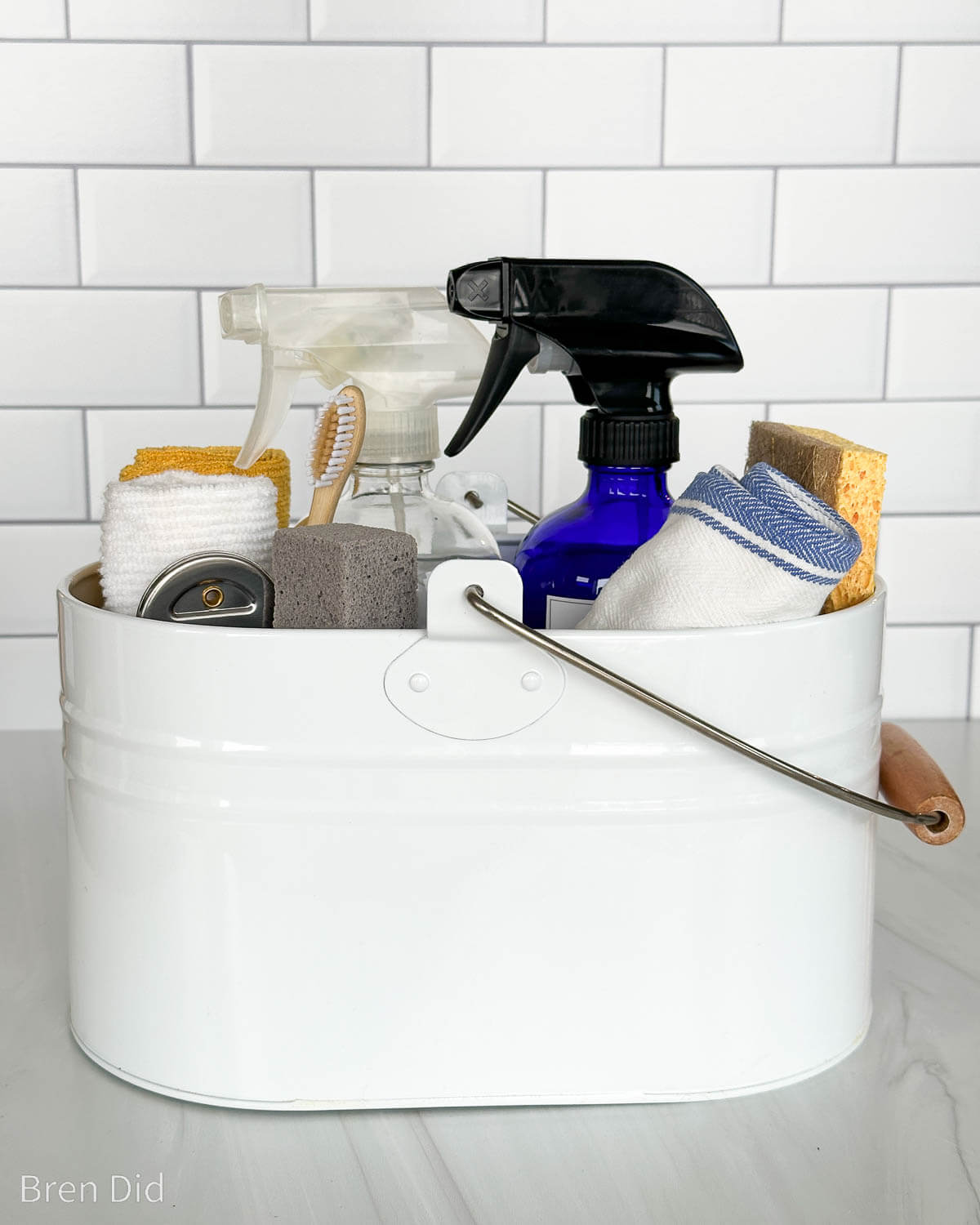
Best Tools for Storing Cleaners
Keep your cleaning tools organized using these 3 tools. For easy access, consider designating a specific storage area for them, such as a cleaning closet or cabinet near the areas where they are used.
Spray Bottles
Store homemade cleaners in glass or plastic spray bottles. Buy new or reuse existing cleaner bottles and nozzles after cleaning them well. Tip: top an upcycled glass bottle with a plastic nozzle to make your own glass cleaning bottles.
Cleaner Labels
Cleaners can look alike. Make sure to label store-bought and homemade cleaners to quickly identify the bottle you need and make sure you use the right solution to keep your home and family safe.
- Favorite cleaning labels: Use a self-adhesive label or a piece of masking tape.
Cleaning Caddy
A portable cleaning caddy allows you to quickly move cleaning supplies from room to room as you clean. Choose a handled bucket or bin that fits in the cleaning cupboard and has room for your favorite tools and cleaners so you do not have to repack it each time you clean. Consider using one caddy for general household cleaners/tools and a separate caddy for bathroom cleaners/tools. Separate caddies keep cleaning tools separate for sanitary purposes and allow you to store bathroom cleaners in the bathroom for easy access.
- Favorite cleaning caddy: I got my cleaning tote as a gift with purchase, this white metal caddy is very similar.
FAQ
The best cleaning tools are the ones that you actually use! Versatile tools, such as cotton cleaning cloths, a vacuum with HEPA filtering, and a washable mop with detachable pads, are suitable for multiple cleaning tasks around the home. They will help you do lots of cleaning without storing extra tools or wasting money on gadgets that never get used.
To choose the best household cleaning tool, think about the areas you need to clean, then select versatile tools that can be used for multiple tasks around the home. For example, reusable cleaning cloths can be used to dust, wipe counters clean, polish glass, and can even be attached to a flat mop to clean floors. Look for durable, reusable tools, such as a vacuum with HEPA filtering and a washable mop with detachable pads, to minimize waste and environmental impact while having fewer tools to purchase and store.
There are hundreds of household cleaning tools available, but you can clean the house using only these essential equipment items: a vacuum cleaner with HEPA filtering, a mop with a washable pad, and reusable cleaning cloths. You may choose to add a few specialty tools for hard-to-clean spaces, such as a scrub brush for the toilet, a grout cleaning brush, a mop to make washing floors more convenient, a stool for high spaces, and/or a squeegee for streak-free glass cleaning. Start with fewer pieces of equipment and only add items that are needed.
To spend less on cleaning tools, consider trying these tips: invest in versatile cleaning tools that can serve multiple purposes, use reusable cleaning cloths that can be washed and reused multiple times, repurpose items you already have at home for cleaning such as old t-shirt cleaning rags, shop multiple stores such as the Dollar Store or online to compare prices, rent or borrow specialized tools you only need occasionally such as carpet cleaners, and make sure to regularly clean cleaning tools according to manufacturer recommendations so they last longer.
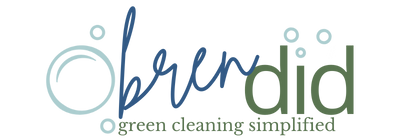

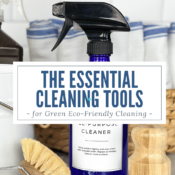
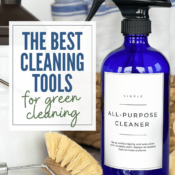
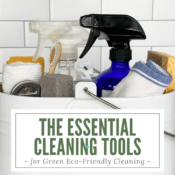
Leave a Reply